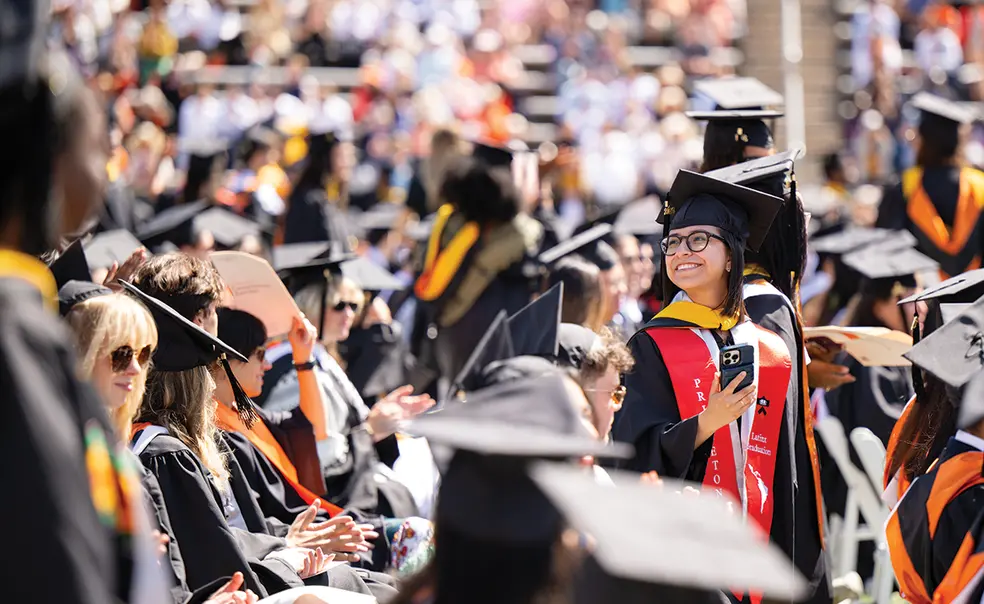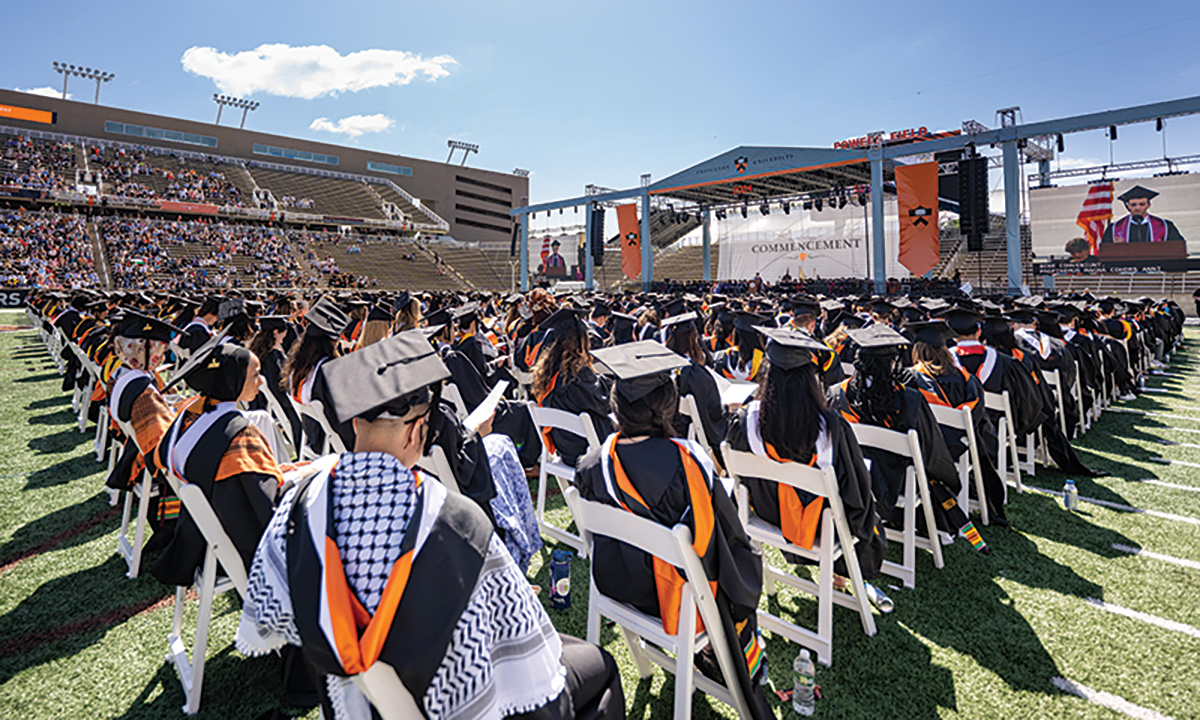At 2024 Commencement, Grads Celebrate Learning Together
Find “opportunities to work with those with whom you may disagree,” Nusrat J. Choudhury *06 told graduates
Princeton’s commencement moved in 2021, from the front lawn of Nassau Hall to its new home in the more spacious surroundings of Princeton Stadium. But the tradition of exiting through FitzRandolph Gate remains: An hour after seniors recessed from the ceremony on May 27, the line at the gateway was still about 50 grads deep, with a corresponding crowd of family members outside, ready to snap photos.
Eudan Mojados ’24, waiting his turn, reflected on the four years that brought him to this point. Enduring the remote-learning fall and socially-distanced spring of freshman year, he said, made him appreciate the experience of learning alongside his classmates. “Having that face-to-face casual conversation, or just your weekly study sessions with your friends, it’s a lot easier,” he said. As Princeton conferred 1,297 bachelor’s degrees and 609 graduate degrees on May 28, the experiences of learning together and applying what you’ve learned were common themes across festivities.

At Sunday’s Baccalaureate service, Nusrat J. Choudhury *06, a master’s of public affairs alumna, spoke about her work interacting with people “from all corners of our society” as a U.S. federal judge. (She is the first Muslim woman and first Bangladeshi American to fill that role.)
“I hope that as you move forward in your chosen professions that you approach different opinions and perspectives not as a threat — but as an opportunity to learn,” Choudhury said. “And I hope that you, like me, take advantage of the fact that you may achieve even more than you dreamed possible by finding opportunities to work with those with whom you may disagree — even where those disagreements are significant.”
“I hope that as you move forward in your chosen professions that you approach different opinions and perspectives not as a threat — but as an opportunity to learn.”
— Nusrat J. Choudhury *06, first Muslim woman and first Bangladeshi American U.S. federal judge, speaking at the Baccalaureate service
The Graduate School’s hooding ceremony, held in Jadwin Gymnasium because of rain, included remarks by Provost Jennifer Rexford ’91, who urged the advanced degree recipients to share their knowledge. “Those of you assembled here today represent a wide array of areas of intellectual exploration and of points of view, on a range of important issues,” she said. “But I also know that you share a deep appreciation for the importance of advanced learning. Whatever you do and wherever your career takes you, I hope you find ways to communicate the value of scholarship, research, and teaching to the broader public.”
At Commencement, valedictorian Genrietta Churbanova ’24 recalled her inquisitive youth, when she asked so many questions that her sixth grade history teacher decided to limit her to three questions per class; she evaded the rule by slipping written questions to her friends for them to ask. “No such high-stakes note passing is necessary at Princeton,” she said, gratefully.
Churbanova told her classmates that the best way to pay their education forward was to continue the pursuit of knowledge. “Wherever you are and whatever you do, do not stop learning,” she said, “for when we stop learning,
we stagnate. Remember that those around you always have something to teach you.”
Salutatorian John Freeman ’24, addressing the graduates in Latin, compared their shared challenges in the classroom and beyond to those endured by Hercules and Sisyphus, noting that by completing their theses, they’d avoided the fate of the latter. “We surely have reached the top and now is the time to rejoice in our great achievements,” he said, in a translation of his remarks. “Our glory shall be as sweet as the labor was hard.”
President Christopher Eisgruber ’83 had the final word at Commencement, a tradition that he said usually helps the University avoid that “flash point for campus controversy,” choosing a graduation speaker. “This year,” he said, “I recognize that I am myself a controversial choice for at least some of you,” an acknowledgement of the tensions between the administration and pro-Palestinian protesters in recent weeks.
On the morning of Commencement, The Daily Princetonian reported that the University was holding the degrees of two graduating seniors because of disciplinary investigations related to the disruption of Eisgruber’s speech to alumni at Reunions. University spokeswoman Jennifer Morrill confirmed in an email to PAW that there was an ongoing investigation and holding degrees is standard practice “when seniors are involved in alleged disciplinary violations soon before Commencement.” In June, Princeton Israeli Apartheid Divest announced on social media that the two students had received their diplomas.
During Eisgruber’s Commencement speech, a few dozen graduates stood and turned their backs to the stage in silent protest, while a handful from the graduate student section walked out. At least three groups of spectators draped flags or banners with pro-Palestinian slogans from the stadium’s upper tier.
Eisgruber, continuing without interruption, spoke about how grateful he was for how this year’s graduates restored campus life after the pandemic gap. “Your energy and initiative were essential in the wake of a pandemic that, in addition to robbing us of so many other things, eroded the norms and habits of social activity,” he said. “You came to Princeton, and you breathed new life into our community.”
Eisgruber pointed to extracurricular groups reborn or revitalized and new paths followed in research and scholarship as legacies of this year’s grads.
“My wish for you,” he said, “is that you lean into life after Princeton and into your community, wherever you are, with the same dazzling energy and imagination you’ve shown while you were here.”













No responses yet